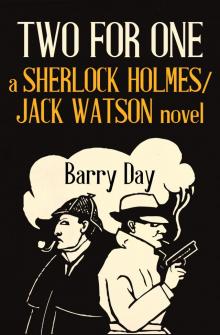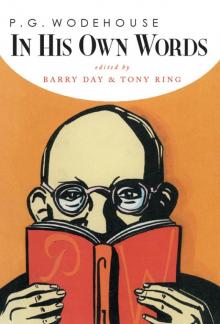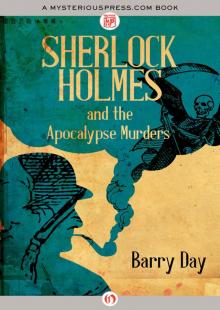Sherlock Holmes and the Alice in Wonderland Murders Read online
Page 3
“You mean, somebody managed to tie the monster up?” It came out sounding absurd but the idea seemed so ludicrous.
“Just so, Watson, just so. By the depth of the groove in the bank, I should estimate a length of some twenty feet, a displacement of just over a ton—not counting, of course, the two men in its belly.”
I wondered if I could believe my ears. Perhaps all this talk of Alice In Wonderland had affected my friend’s brain. Seeing the expression on my face, Holmes finally took pity on me.
“Forgive me, Watson, but your honest reaction to events is more necessary to me than you can ever know. You curb my excesses and bring me back to basics. Take a look at this …”
He unfolded the handkerchief and lying on it I saw two small fragments of wire. “These, Watson, are torn from a high tension wire cable capable of taking considerable strain. The fact that the cable has frayed at all suggests it was restraining something of a significant mass. Restraining—or mooring. Had that object been a living creature, I think we could safely expect the groove it made entering the water to show some signs of irregularity, suggestive of whatever appendages it uses to manoeuvre through the water. Instead, the groove is perfectly smooth …”
“Like the hull of a ship?”
“In a nutshell—a ship or, more specifically, a submersible, holding, I would guess, two men—one to steer and one to manipulate the superstructure Mr. Moxton’s guests saw as the ‘monster’. You will no doubt recall, Watson, that our French friends launched a torpedo boat, the Gymnote some ten years ago. Since then I am informed that experiments have been undertaken to make such machines both lighter and more flexible. And what with the contribution of Herr Rudolf Diesel …”
He indicated the black liquid on his finger.
“A lightweight fuel oil which will make the steam engine archaic. And there you have Moxton’s Monster.”
“A fraud,” I cried indignantly, “a damned fraud! And yet tomorrow he’s going to tell the world the monster exists and he’ll have witnesses to back up his story. It’s incredible!”
“I’m afraid that’s the one thing it won’t be, Watson. Moxton’s theory of the nature of truth is becoming all too credible. You read about a thing—therefore it is. Especially if there’s a large picture to go with it. And I think we may safely deduce that tomorrow’s Clarion will carry precisely such a photograph. In fact, I’d be prepared to wager that front page was already set and waiting some time before we were witness to his little charade. If he sincerely believes that a word can mean what he chooses it to mean and if Confucius is correct in his assumption that a picture is worth a thousand words … I leave the mathematics to you.”
“You mean that the perception is as good as the truth?”
“Better, Watson, better. Particularly if people are given the perception they would like to see. No, I’m afraid that in the future people like our friend—with the aid of sufficient funds and the available technology—will be able to provide the so-called ‘people’ with a version of the world they would prefer to live in. And if the uncomfortable reality should occasionally leak through, well … twenty-four hours and another headline will conveniently cover it up again.”
“But Holmes, if you’re even remotely right, this is insupportable. We must do something—but what?”
“I’m very much afraid, old friend, that we must revisit Reichenbach and finish the job I had foolishly assumed was over seven years ago.”
I must have looked rather like one of the fish I had been singularly unsuccessful in catching earlier but Holmes was kind enough to make no mention of my open mouthed stare. Instead, as he swung himself up into the driver’s seat and helped me up beside him, he merely added in a conversational tone.
“I had assumed you realised that Moxton is our friend Moriarty? Now, I believe I promised you a decent dinner?”
CHAPTER THREE
“Moriarty?”
“Yes, Watson—Moriarty. If you repeat his name one more time in that tone of voice it will make a round twenty times of asking.”
“But the world knows that Moriarty died at the Reichenbach Falls …”
“Just as the world knew I died at the Reichenbach Falls—except that now it knows that I didn’t And if you’re not going to eat that last piece of Stilton, you might edge it this way. The fresh air seems to have given me quite an appetite.” Abstractedly I did as he asked. “But how did you spot him, Holmes?” Now my friend grew serious at last. “I admit, Watson, I have had the advantage of you. I sensed his presence, just as I did all those years ago. Lots of little things began to add up again—a case of arson here, a murder or an industrial dispute there … all the individual threads admittedly tenuous but slowly coming together to weave a pattern, a web of disruption and evil. At first I could not believe it—perhaps because I did not want to—but then I was forced to face the fact that I had seen such a pattern before and only one man was capable of weaving it. One Napoleon of Crime is perhaps inevitable in a lifetime—but two?”
“Then increasingly, the face of the spider in the middle of the web began to clear. The name of John Moxton began to crop up too often for either comfort or coincidence. Moxton or one of his associates. You noticed ‘Professor James’ this afternoon?”
“Fellow with the box of tricks? Certainly. Why?”
“‘Professor James’ is no more a professor than you are, Watson. He used to go by the name of Kurt Krober. At least he did when he was one of Moriarty’s henchmen. And if those wires were connected to anything, I’ll eat Lestrade’s bowler hat.”
“Which reminds me.” He took out a folded paper from an inside pocket. “This cable came from Lestrade while we were out enjoying ourselves. I asked him to contact my old friend, Wilson Hargreave of the New York Police Bureau to find out all that is known about the mysterious Mr. Moxton. Let’s see what he has to say …”
He unfolded the several sheets and scanned them quickly. “Ah, most interesting. Let me see … John Moxton, born New York City, June 1839 … etc … etc … entered family publishing business … takes over in 1887 … quite a modest little enterprise by the look of it and Moxton appears to do little to change its fortunes … ah, here we are, Watson. 1893 Moxton apparently suffers a complete breakdown quite unanticipated by his colleagues and friends. The man is a widower with only one sister living …”
“Alicia’s mother?”
“Quite so, Watson,” Holmes shot me a thoughtful glance. “Miss Creighton’s mother and herself a widow. Mother and daughter had not seen Moxton for many years, since they lived in Europe. Moxton, therefore, had, in effect, no close family. He was apparently whisked away to a sanatorium and kept in total seclusion under the care of his personal physician, Julius Minton …”
Holmes turned the page. “A year later he returns to New York fully recovered. His co-workers are impressed by the new energy he now brings to his work. Many of them describe him as ‘a new man’. From that point the business takes off dramatically. Moxton apparently turns into a veritable tycoon, arranging financial deals that transform this rather sleepy little publishing house into a force to be reckoned with …” He skimmed the rest of the report. “And the rest, as our American friends are fond of saying, is history. Exit John Moxton. Enter the new John Moxton …”
“But what makes you so sure he’s Moriarty, Holmes? Admittedly I only caught a glimpse of him at Reichenbach but I was left with an impression of a tall thin man, almost cadaverous …”
“Much easier for a thin man to become a fat one, Watson, than for a naturally heavy man to lose weight—as I think you will agree?”
I hastened to change the subject Mrs. Hudson’s good plain cooking was taking its toll on my waist line and I suddenly realised that when I had met Miss Creighton earlier I was conscious of holding in my stomach. Such is male vanity! Fortunately Holmes was in no mood to be diverted from the trail. “And, of course, a clever tailor can add immeasurably to the desired effect.”
“But the face
? The man looks nothing like Moriarty.”
“Yes, indeed, the face …”
Holmes pondered the question as he took out one of his favourite pipes and filled it with some foul-smelling concoction. Not to be outdone, I produced my own pipe and soon my Arcadia mixture was at least providing a protective cloud. “There are only two men in the world who presently have the skill to reconstruct a face with that degree of subtlety. Soon, I have no doubt, such cosmetic surgery will become a veritable industry and we shall all be able to change our appearance as often as we change our clothes. But today …?
“I would have said Duchamps of Utrecht … particularly skilled with the eyes. You remember we ran across him a couple of years ago in the case of the politician, the lighthouse and the trained cormorant—and by the way, old fellow, when are you going to get around to writing that one up? It was not without its points of interest. Where was I? Ah, yes, Duchamps … I believe we can rule him out. I hear he is serving the pleasure of the Belgian authorities … which leaves us with Zuckerman of Boston … Yes, the nose has all the hallmarks of Zuckerman’s work and, unless I miss my guess, we shall find that Moxton just happened to be taken to Zuckerman’s clinic after his ‘breakdown.’”
“So Moriarty becomes Moxton?”
“Moriarty becomes Moxton and brings all his considerable financial resources to bear using the real Moxton’s publishing company as a base of operations. Let us not forget, Watson, that when his empire was supposedly broken up and scattered to the four winds, no one really knew precisely where he had secreted his ill-gotten gains. There were twenty known bank accounts apart from the Crédit Lyonnais and it is reasonable to believe these were only the tip of the iceberg. It would be a simple matter to channel them deviously back to the new centre of the web.”
“But what about Alicia—Miss Creighton?”
“That, admittedly, was something Moriarty had not bargained for. The mother’s will left the girl in her brother’s charge and the new Moxton could hardly renege on the arrangement without drawing unnecessary attention to himself. Ergo, she becomes his ward and is now living under circumstances of some considerable danger, if she did but know it.”
I remembered the look on that lovely face and knew instinctively that Alicia Creighton had more than a suspicion that something was amiss. Holmes was still musing on the reincarnated Moriarty.
“You know, Watson, even the cleverest criminals—and heaven knows, Moriarty is the cleverest of them all—give themselves away by the tiniest things, the merest trifles. And my method, as you know better than anyone, is based on the observance of trifles …”
“What trifle did I overlook in this case?” I asked, knowing that it was my expected response.
“Personal vanity. The crisis of identity, even when one is seeking to camouflage that identity. The criminal who changes his name will, more often than not and quite by instinct, craft a new name with the same initials, J.M. James Moriarty becomes John Moxton—even for a time Julius Minton. Another habit that is hard to shake off is the nervous mannerism. We all have them and are usually totally unaware of their existence. You, for example, chew the end of your moustache when you are concentrating—you are doing it this very moment.”
Naturally, I stopped immediately and gave the offending decoration a quick brush with the back of my hand.
“… Moriarty has the habit of pinching the bridge of his nose and it was perfectly clear to me that Moxton was finding it difficult to adjust to the more fleshy protuberance the surgeon’s knife had left him with.” He found this so amusing I did not have the heart to tell him that he had precisely the same nervous habit as his old rival.
“But had I been in any doubt—which by that time I most certainly was not—his handshake confirmed it. It went against the grain to offer him my hand, I can tell you, Watson, but it served its purpose. Moriarty had a protuberance on the wrist bone of his right hand. So, by an amazing coincidence, does Moxton. QED.”
“So what’s his little game, Holmes?” I asked.
“Money, of course, but mainly power. The sight of other people running around like ants, while he decides which to tread on and which to spare. Power through chaos. Chaos is his minion. Words are his new weapons. I very much fear, Watson, that we are fast approaching a point where many of the old rules are stretched to breaking point and the cynical bid fair to inherit the earth. In such a context a man like Moriarty naturally thrives. There is a strain of pure evil in his blood which his extraordinary mind raises to the power of—well, I would hesitate to calculate.”
“What do we do now, Holmes?” I asked the question that had been tormenting me throughout his explanation. “Call in Scotland Yard? Unmask him?”
“Nothing so straightforward, I’m afraid, old fellow. At this moment the man has committed no crime. To prove that he is not who he says he is would involve endless complications, starting with a defensive wall of lawyers a mile deep—not to mention alerting the man, when we need him, if not off his guard, then at least so overconfident that he believes himself to be impregnable.”
“The game is afoot, Watson and will not be over until we have led this Napoleon to his own Waterloo. For the time being we need do nothing but wait. I have never been surer than I am of the fact that Moriarty will come to me. A game of this kind—whatever game that turns out to be—is not worth the candle to him unless he beats me into the bargain. He wants revenge, Watson, revenge for the ignominy of Reichenbach, as he sees it. He let me catch his scent, I’m sure of it, for he knows I will follow the trail.”
He puffed for a moment in silence, then said, almost to himself—“The yin and the yang—the twin principles of the ancient Chinese universe. The Chinese believed that the one could not exist without the other. Perhaps the Professor and I are like that. We shall see …”
“And now, my dear chap, you’ve had the dinner I promised you and who knows when we may have this breathing space again? Time to turn in, I think. We really do have a train first thing in the morning …”
CHAPTER FOUR
I came down to breakfast in Baker Street a couple of mornings later to find Holmes crouched on the floor amidst a heap of newspaper cuttings that he was moving around like chessmen, trying one first in one position, then another, before finally committing himself. The fact that he was wearing his mouse-coloured dressing gown as well as smoking his favourite old black pipe was enough to alert me to the fact that serious work was in progress.
Coughing discreetly to announce my presence—as well as to disperse the claustrophobic fog sufficiently to reach the breakfast table in comparative safety—I picked up my own paper and was relieved to see that it appeared to be intact. It would not have been the first time that the Daily Chronicle, by which I set such store, had been an early morning sacrifice to Holmes’s insatiable need to clip and file. “I see we have a three pipe problem on our hands,” I remarked, “and that you are at present at the third pipe stage?”
“Excellent, Watson. Your powers of deduction must never be underestimated, I see. I assume you made a mental note of the number of piles of plugs and dottle accumulated on the mantlepiece before retiring for the night. Then, having decided that it would be impolitic to sweep a few into the embers of the fire, in case I had made my own calculations, reluctantly decided to endure my matutinal conflagration for the sake of domestic peace?”
“Something of the sort,” I muttered grudgingly, flicking through the paper, so as not to give him the satisfaction of total submission. “I suppose I left incriminating fingerprints on the mantlepiece?”
“Not to my knowledge, old fellow. I simply happened to be observing you through the crack in my bedroom door.” Which thought appeared to amuse him immoderately. Sometimes the man is positively childish. All of which was immediately forgotten when I came to study the front page properly.
“Have you seen this, Holmes?” I cried. “Absolutely appalling state of affairs!” I held out the paper.
“Almost certai
nly not,” my friend replied, still absorbed by his jigsaw of cuttings. “As you know perfectly well, I read little beyond the crime news and the agony columns. There is enough disaster, scandal and calumny reported there to fill several normal lifetimes. What social peccadillo in particular has caught your eye? Some lady turned away from the Café Royal for smoking Turkish cigarettes? Some major from the shires blackballed for wearing the wrong coloured socks in the card room?”
“You may joke,” I said, with what I hoped was a chilly dignity, “but the sight of the seat of government infested with vermin is hardly likely to raise our status in the eyes of the rest of the world. It says here …” And I began to read from the paper …
“OF MICE AND MEN … AND RABBITS!
House of Commons Chaos.
Parliamentary business was disrupted for several hours yesterday when the lower chamber was suddenly overrun with several dozen white rabbits. The animals appear to have been introduced through the heating vents and proceeded to run amok. It was several hours before the last of them was caught and removed and the Speaker could restore order to the proceedings. The spectacle of senior—and in many cases, nationally prominent—politicians standing on their benches to avoid contact with the rabbits, many of whom (the rabbits, that is) proved to be incontinent due to the excitement of the occasion, was more reminiscent of a music hall farce than the usual dignified deliberations conducted in the hallowed premises. As one newly elected (Independent) MP confided to this reporter on condition of anonymity: ‘It certainly raised the interest level of a rather boring debate. We should do this more often.’ The police are pursuing their enquiries …” etc., etc.
The paper was unceremoniously snatched out of my hands and Holmes was striding up and down the room devouring the story.
“Rabbits, rabbits … white rabbits. Of course …”
“Of course, what?” I asked testily.
“Alice, of course. Here, Watson, look at this …” He riffled through the cuttings on the floor until he found what he was looking for, a small piece of paper roughly torn around the edges. He threw it on the table in front of me, narrowly missing a soaking in my cup of tea.

 Two for One
Two for One Sherlock Holmes and the Alice in Wonderland Murders
Sherlock Holmes and the Alice in Wonderland Murders Sherlock Holmes and the Seven Deadly Sins Murders
Sherlock Holmes and the Seven Deadly Sins Murders P.G. Wodehouse in his Own Words
P.G. Wodehouse in his Own Words Sherlock Holmes and the Apocalypse Murders
Sherlock Holmes and the Apocalypse Murders Sherlock Holmes and the Shakespeare Globe Murders
Sherlock Holmes and the Shakespeare Globe Murders